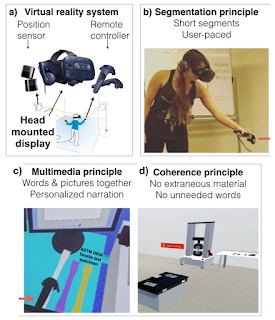This paper describes the application of new Virtual Learning Environments (VLEs) in engineering education. It demonstrates how VLEs improve student learning in two engineering concepts compared with the traditional classroom setting. Literature has conflicting studies on both the advantages and disadvantages of learning in VLEs. The application of VLEs in engineering concepts has not been investigated with a specific focus of multimedia learning theories. This study aims to demonstrate the effects of VLEs on student learning of engineering concepts. The proposed VLE approach can be adapted to teach any engineering course with hands-on activities. VLEs have strong potential to enhance the student learning of concepts that require high cognitive load such as three-dimensional visualizations and time dependent phenomena. In this study, we introduce VLEs as a potential alternative to expensive laboratory experiments. Students are able to visualize and perform simple experiments and hands-on learning using the virtual reality interface. The study described here follows a control – treatment comparison with the treatment group completing hands-on activities in the VLEs. Students who experienced VLEs outperformed students who learned in a traditional classroom setting.
Article Details

